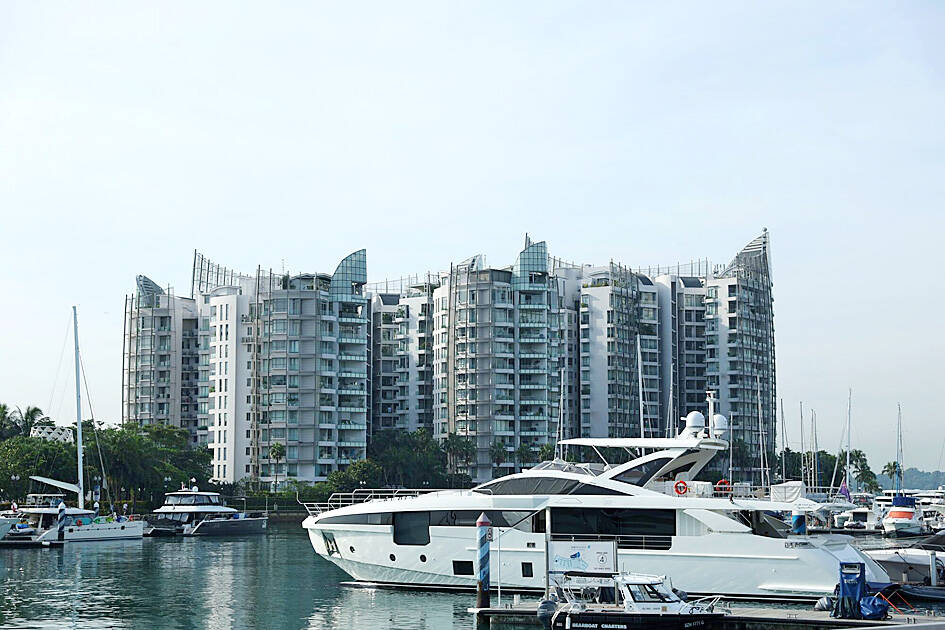The number of luxury condominium units bought by foreigners rose to the highest in almost a decade before Singapore doubled taxes on purchases by the demographic.
Foreigners bought 159 non-landed, luxury homes in Singapore’s core central region in the first quarter, a report by OrangeTee & Tie Pte (橙易產業) showed.
That is up from 71 units a year earlier.

Photo: Bloomberg
The number of luxury condominium units bought by mainland Chinese buyers increased to 111 units, up 158 percent year-on-year, the real-estate company said.
Singapore authorities last month doubled property levies for foreigners to 60 percent, the highest among major global cities, as part of efforts to cool the housing market.
The government has said that the policy is a pre-emptive move as investment demand for residential property is likely to continue to grow otherwise.
“The cooling measures may not affect buyers’ perception of Singapore as one of the best places for property investment,” OrangeTee senior vice president Christine Sun (孫燕清) said, citing economic fundamentals. “Some high-net-worth individuals may continue to park their wealth here as luxury properties are pricey in many other cities.”
Singapore’s home sales surged 80 percent last month from a month earlier to a seven-month high as more projects were launched, government figures released yesterday showed.
Purchases of new private apartments rose to 887 units, Urban Redevelopment Authority data showed.
Foreigners bought 70 units last month, the most since May last year, Huttons Asia Pte Ltd (合登亞洲) senior director of research Lee Sze Teck (李思德) said.
Most purchases were in the S$2 million (US$1.5 million) to S$5 million category, he said.
Geopolitical tensions might have led more foreigners to buy Singapore properties as a safe-haven asset, he added.
While there could be a knee-jerk reaction to government curbs, the measures should have little effect on purchases between S$1.8 million and S$4 million, said Tan Tee Khoon (陳智群), Singapore country manager at PropertyGuru.
“Demand remains from the upgraders as households have a stronger liquidity position due to intergenerational wealth transfers,” Tan said.
The risk of further curbs down the road might prompt some property seekers to bring forward their purchases, he added.

Hon Hai Precision Industry Co (鴻海精密) yesterday said that its research institute has launched its first advanced artificial intelligence (AI) large language model (LLM) using traditional Chinese, with technology assistance from Nvidia Corp. Hon Hai, also known as Foxconn Technology Group (富士康科技集團), said the LLM, FoxBrain, is expected to improve its data analysis capabilities for smart manufacturing, and electric vehicle and smart city development. An LLM is a type of AI trained on vast amounts of text data and uses deep learning techniques, particularly neural networks, to process and generate language. They are essential for building and improving AI-powered servers. Nvidia provided assistance

DOMESTIC SUPPLY: The probe comes as Donald Trump has called for the repeal of the US$52.7 billion CHIPS and Science Act, which the US Congress passed in 2022 The Office of the US Trade Representative is to hold a hearing tomorrow into older Chinese-made “legacy” semiconductors that could heap more US tariffs on chips from China that power everyday goods from cars to washing machines to telecoms equipment. The probe, which began during former US president Joe Biden’s tenure in December last year, aims to protect US and other semiconductor producers from China’s massive state-driven buildup of domestic chip supply. A 50 percent US tariff on Chinese semiconductors began on Jan. 1. Legacy chips use older manufacturing processes introduced more than a decade ago and are often far simpler than

STILL HOPEFUL: Delayed payment of NT$5.35 billion from an Indian server client sent its earnings plunging last year, but the firm expects a gradual pickup ahead Asustek Computer Inc (華碩), the world’s No. 5 PC vendor, yesterday reported an 87 percent slump in net profit for last year, dragged by a massive overdue payment from an Indian cloud service provider. The Indian customer has delayed payment totaling NT$5.35 billion (US$162.7 million), Asustek chief financial officer Nick Wu (吳長榮) told an online earnings conference. Asustek shipped servers to India between April and June last year. The customer told Asustek that it is launching multiple fundraising projects and expected to repay the debt in the short term, Wu said. The Indian customer accounted for less than 10 percent to Asustek’s

Gasoline and diesel prices this week are to decrease NT$0.5 and NT$1 per liter respectively as international crude prices continued to fall last week, CPC Corp, Taiwan (CPC, 台灣中油) and Formosa Petrochemical Corp (台塑石化) said yesterday. Effective today, gasoline prices at CPC and Formosa stations are to decrease to NT$29.2, NT$30.7 and NT$32.7 per liter for 92, 95 and 98-octane unleaded gasoline respectively, while premium diesel is to cost NT$27.9 per liter at CPC stations and NT$27.7 at Formosa pumps, the companies said in separate statements. Global crude oil prices dropped last week after the eight OPEC+ members said they would